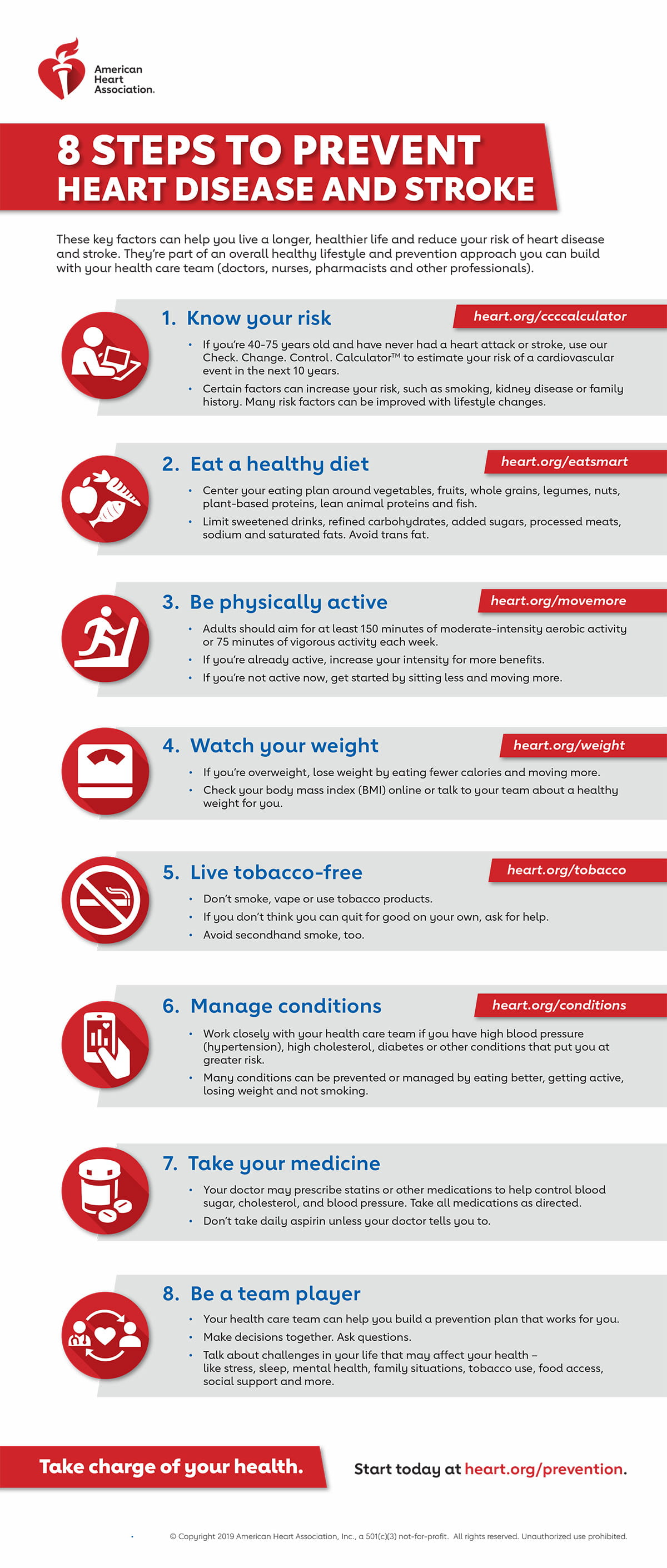Heart disease prevention is critical for safeguarding our overall health, given that cardiovascular disease stands as the leading cause of death in the United States. This stark reality highlights the importance of proactive measures like cholesterol management, regular screenings, and understanding the risk factors for heart disease. Adopting heart health tips into daily routines can significantly reduce the likelihood of developing serious complications. Healthcare professionals are urging patients to recognize the accumulated damage caused by poor lifestyle choices over the years. By prioritizing heart disease prevention now, we can pave the way for a healthier future and improve our quality of life.
Preventing heart-related illnesses is essential in today’s health landscape, as cardiovascular conditions are alarmingly prevalent. Many individuals may not realize that proactive strategies—such as monitoring blood pressure and cholesterol levels—are vital in minimizing one’s risk. Embracing lifestyle modifications and obtaining regular check-ups can empower people to take charge of their cardiovascular health. Additionally, understanding the various factors contributing to heart disease can motivate individuals to make informed choices. In essence, effective avoidance of cardiovascular diseases hinges on collective awareness and action towards comprehensive heart health.
Understanding Cardiovascular Disease: The Untold Dangers
Cardiovascular disease remains the leading cause of death in America, but many still underestimate its seriousness. Unlike other illnesses, such as cancer, which evoke immediate action from patients and their families, heart disease often elicits a complacent attitude. Experts like Ami Bhatt emphasize that this lackadaisical approach to heart health can have dire consequences. The gradual accumulation of cardiovascular damage often presents a false sense of security, making it difficult for patients to realize the urgency of preventative measures until it’s too late.
In treating patients, healthcare professionals frequently encounter misconceptions about heart disease. Joseph Woo notes that many patients do not understand the stark reality that cardiovascular disease causes more deaths annually than all cancers combined. By fostering a better understanding of the disease, patients may be encouraged to prioritize screenings for heart disease, manage their risk factors effectively, and ultimately improve their outcomes.
Frequently Asked Questions
What are effective heart disease prevention strategies?
Effective heart disease prevention strategies include adopting a balanced diet low in saturated fats and refined sugars, increasing physical activity, managing cholesterol levels, and avoiding smoking. Regular screening for heart disease risk factors such as high blood pressure and high cholesterol is also crucial for early detection and prevention.
How can cholesterol management contribute to heart disease prevention?
Cholesterol management is vital for heart disease prevention as high levels of LDL (‘bad’) cholesterol can lead to plaque buildup in arteries, increasing the risk of heart attacks and strokes. Maintaining a healthy diet, exercising, and possibly using statins under medical guidance can help keep cholesterol levels in check.
What are the key heart health tips for reducing the risk of cardiovascular disease?
Key heart health tips include achieving and maintaining a healthy weight, engaging in at least 150 minutes of moderate exercise per week, eating a heart-healthy diet rich in fruits, vegetables, whole grains, and healthy fats, and managing stress effectively. Additionally, regular screenings for blood pressure, cholesterol, and diabetes are essential.
Why is screening for heart disease important in prevention?
Screening for heart disease is crucial because it allows for the early detection of risk factors like high cholesterol, high blood pressure, and diabetes, which can be managed effectively with lifestyle changes or medications. Early intervention significantly reduces the chances of severe cardiovascular events.
What are the major risk factors for heart disease that everyone should know?
Major risk factors for heart disease include high blood pressure, high cholesterol, smoking, obesity, physical inactivity, diabetes, and a family history of heart disease. Understanding these risk factors helps individuals take proactive steps toward heart disease prevention.
| Key Points | Expert Insights | Advancements in Treatment | Challenges in Prevention |
|---|---|---|---|
| Cardiovascular disease is the leading cause of death in America. | Experts emphasize a casual attitude towards heart disease prevention among patients. | Advancements in surgery, such as heart transplant techniques, improve recovery times. | Many patients delay screenings and treatment despite the high risks associated with heart disease. |
| Heart disease is compared to cancer in its seriousness, yet patients don’t react as urgently. | Experts suggest knowing numbers like LDL cholesterol and blood pressure from a young age is crucial. | Wearable devices empower patients to monitor their health proactively. | Lack of adherence to prescribed medications leads to undertreatment of cardiovascular issues. |
| The public remains unaware of the severity of heart disease compared to other conditions. | Open discussions among experts can bridge knowledge gaps for patients. | Minimally invasive surgeries reduce recovery periods significantly compared to traditional methods. | Patient navigators can help improve chronic care management and adherence to treatment plans. |
Summary
Heart disease prevention is critical as cardiovascular disease remains the leading cause of death in America. Despite advancements in treatment and awareness initiatives, many patients approach heart health with a casual attitude, often postponing preventative measures. It is essential that individuals recognize the importance of early intervention and regular monitoring of their cardiovascular health. This proactive approach can save lives and significantly reduce the risks associated with heart disease.
